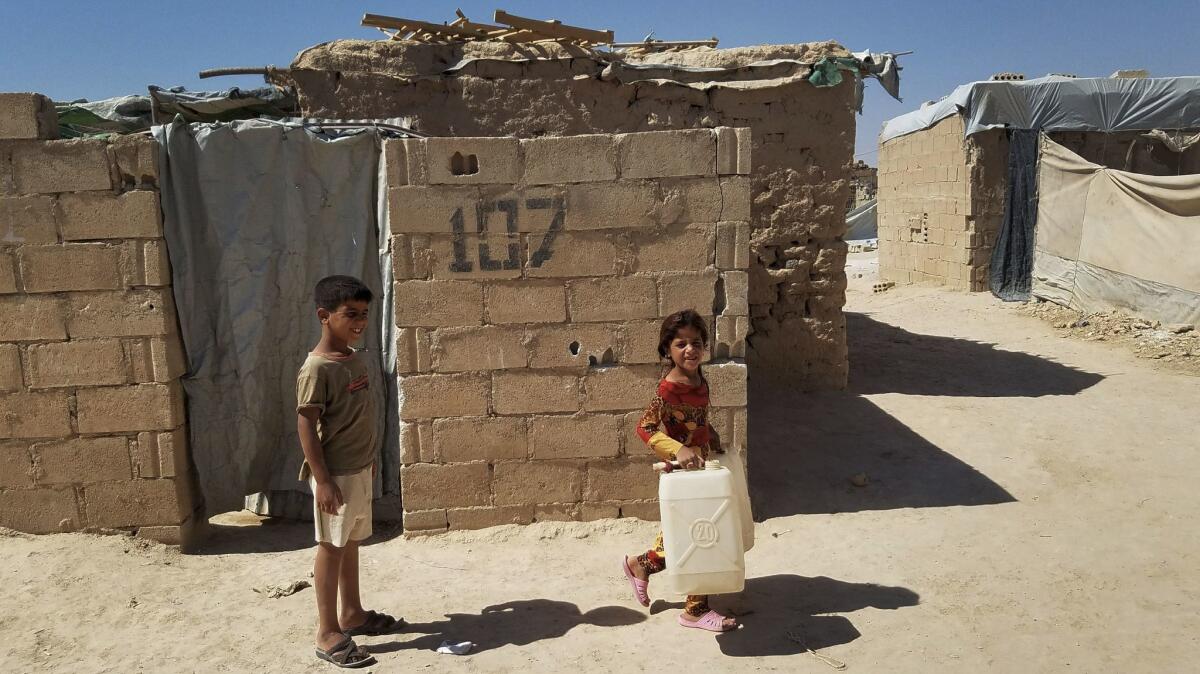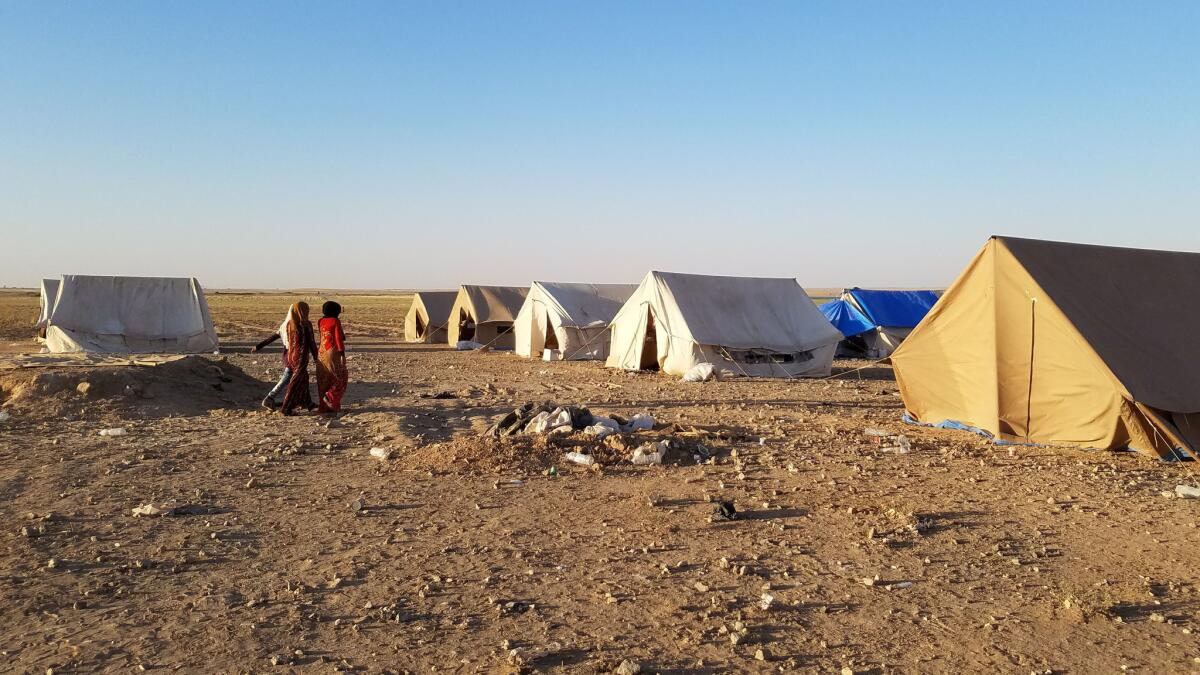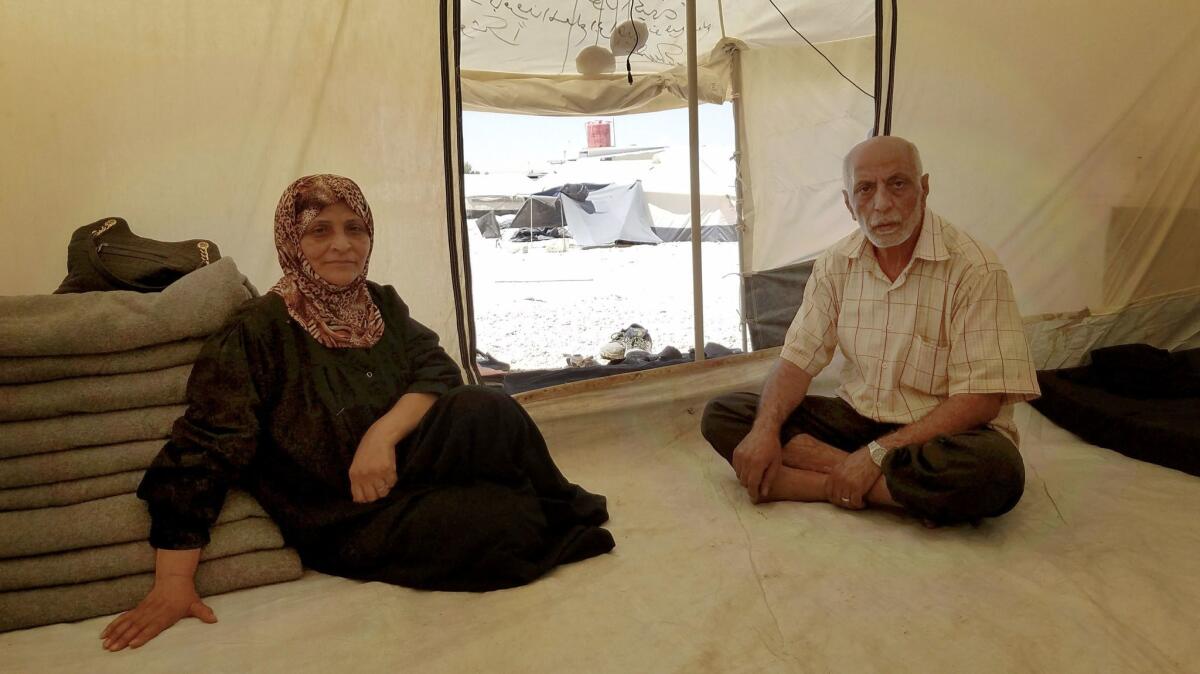‘We just need a paper to get out of here, even if we’re going to hell’: The dismal world of Syria’s displaced

- Share via
Reporting from Shaddadi, Syria — For more than a month, thousands of people who fled Islamic State in southern Syria have lived on the sandy banks of a lake full of water they cannot safely drink.
Families with small children are surviving on the single box of canned food they were issued when they arrived, and going to the bathroom in nearby fields. Hundreds more arrive daily.
Camped in flimsy canvas tents on the banks of Arishah Lake, named after the late older brother of President Bashar Assad, Bassel Hafez Assad, they live without running water or electricity, next to burned garbage and soiled diapers. Some have already died. Many are sick. When strangers arrive, camp dwellers rush over, waving small sheets of paper and hoping the newcomers are medical professionals.
The papers are diagnoses issued by the sole doctor who visits every few days. He doesn’t actually treat the camp dwellers; he just gives them enough information to know they need treatment. For that, they must pay, and no one here has much money. If they did, they said, they would leave.
Most cannot afford to pay smugglers the going rate of $400 to escape. Many already paid several hundred dollars to get here, traveling 80 miles north from the militant redoubt of Dair Alzour. The smugglers had promised to spirit them safely to relatives farther north and west. Instead, they became mired in this lakefront wasteland. Kurdish authorities seized their identification cards when they arrived and won’t let them leave until they pass security screening. That could take months.

Bare-bones camps have sprung up in eastern Syria as officials try to cope with an influx of nearly a million displaced families from Syria and more from across the border near Mosul in northern Iraq, according to the U.N.
Kurdish militias forced Assad’s forces to withdraw from this part of eastern Syria five years ago, and Kurdish officials have since governed the besieged area, including the camp. Officials said that they try to provide for displaced people, but that even local cities are facing difficulties restoring electricity and water services. They have appealed to the United Nations for aid and received some, but not enough to help everyone arriving at the camp, they said.
After fleeing here with his mother and three siblings, 14-year-old Jamal Mustafa Shami sold his cellphone to buy bread, water and ice.
“We’ll run out in coming days,” he said.
Similar hastily constructed, bare-bones camps have sprung up elsewhere in eastern Syria as officials try to cope with an influx of nearly a million displaced families from Syria and more from across the border near Mosul in northern Iraq, according to the U.N.

To the east of the Arishah camp, near the Iraqi border in Al Hol, nearly 700 Syrians have arrived at a camp already filled with 21,000 displaced Iraqis who fled Mosul. To the north, 12,000 people live in communal tents in a transit camp by a cotton factory in Ain Issa. To the west, near the town of Tabqa, scores of families who fled Islamic State’s self-declared capital, Raqqah, huddled under scrubby pines at the Euphrates River’s edge recently, dodging yellow scorpions and subsisting without toilets or water until they clear security screening.
“We don’t need support, we just need a paper to get out of here, even if we are going to hell,” said Jasim Mohammed, 42, who fled west from Palmyra to join relatives in Aleppo.
Conditions at the camps are desperate, even by the horrific standards of this six-year conflict. Residents said four people at the Arishah camp have died, including a newborn. Camp managers confirmed at least two deaths, including a boy. The managers warned that as the battle to oust Islamic State from eastern Syria intensifies, they cannot afford to care for the tens of thousands expected to flee.
“The number will peak and we don’t have anything to provide them,” said Ahmed Ibrahim, the Arishah camp’s manager.
The lakefront settlement was already packed with about 3,000 people — 700 families — in 400 tents. Camp managers expect to soon see an additional 50,000 fleeing Dair Alzour. Housing them properly would cost $6 million.
Ibrahim works out of an abandoned house atop a hill overlooking the camp. The road leading up to the house is gated and guarded by Kurdish forces, who also keep an eye on the camp overall. Inside, a shipment of several dozen mattresses sat vacuum-packed in a corner under some anti-Assad graffiti. A foreign charity dropped them off the week before, promising more. Ibrahim, concerned about causing conflict, delayed distributing the mattresses until there were enough for every family received one.
Now he wasn’t sure how much longer he could wait. The camp felt tense, desperate. Ibrahim just started work here in recent days. He wore a Panama hat tucked over shaggy hair, a checked dress shirt and oversized watch as if he had just arrived at spring break instead of at an unfolding disaster. He had asked the United Nations for more help.
“We are overloaded. We are just asking the U.N. to send tents, water, bread, milk for the children, formula,” Ibrahim said as he sat outside on a plastic chair, the only furniture in his office.
On the road below, guards tried to placate a group begging for drinking water. The big red tanks in the camp were empty again. It wasn’t clear when they would be refilled.
“Why did that woman get water and we didn’t?” a woman shouted, shaking an empty plastic jug.
The guards didn’t have an answer. The crowd eventually dispersed. Ibrahim shifted in his chair, nervous. There are water shortages, he said, and Kurdish officials cannot afford to provide it to the camp daily.

Scott Craig, a spokesman for the United Nations High Commissioner for Refugees, said officials have provided the camp with tents, blankets and mattresses and were “working to expand facilities there alongside partners and other U.N. agencies such as UNICEF, including providing water.”
He noted that as of last month, the U.N.’s $3.4-billion humanitarian response in Syria was 29% funded, with the refugee agency receiving about the same percentage of required funding. But UNHCR was able to secure a route and drive 25 trucks full of tents, sleeping mats and other supplies to eastern Syria from Damascus in June. The U.N. also sent a team there recently to see how the new route could help expand aid to more camps.
“A humanitarian response is underway and is being stepped up,” Craig said.
Meanwhile, the Arishah camp manager has worried about disease spreading. Water-borne illnesses are on the rise in Syria, including hepatitis A, typhoid and polio, which has been making a comeback this summer, mainly in the Dair Alzour area, according to the World Health Organization. The WHO ran a vaccine campaign there last month, plans another later this month and was monitoring for other illnesses at the camps, said representative Elizabeth Hoff in Damascus.
At the Arishah camp, people were bathing in the lake last month, including children, many getting bitten by mosquitoes and scorpions in the process. Ibrahim could see them from his perch atop the hill, where the evening wind carried the stench of human waste.
He recalled the two people who died at the camp: a man who had walked 25 miles after fleeing Dair Alzour and a boy who became overheated after arriving.
“If we had an ambulance here, maybe we could have provided them with some help,” Ibrahim said.
He also worried about security, and has asked the U.N. to help build a fence around the camp. Already, officials have caught at least one suspected Islamic State fighter trying to blend with civilians. They have also caught and jailed suspected smugglers, Ibrahim said, but more keep coming. His colleagues have screened 600 people since the camp opened, ensured they were not associated with Islamic State and released them. They were trying to screen two dozen more.
Among those still being screened was a 32-year-old baker from Dair Alzour who asked to be identified by a nickname, Abu Hajar, because he was afraid militants might identify him and harm relatives still in the city.
He paid $800 to smuggle his pregnant wife, Fatima, out eight months ago, but couldn’t afford to flee until last month, when he paid $600 to leave with his brother and landed at the camp. Now his wife was 20 miles north with their baby and he was stuck. He said he had to avoid local militias that had been recruiting at the camp, a charge Ibrahim denied. Armed Kurdish fighters could be seen training on the other side of the hill where the camp manager sat, watching.
“We didn’t come to join militias. I came to see my daughter,” said Abu Hajar, who had already shaved the beard militants had required him to wear for years.
Visiting Abu Hajar’s tent, Abu Omar, 40, an electrical company worker also trying to join his wife and two children in Damascus, said conditions at the camp were worse than in Dair Alzour, where he faced daily airstrikes but at least had food and water.
Abu Omar arrived days before with little more than the frayed green polo shirt he was wearing and a worn yellow cap he kept turning in his fingers. Some of his box of food had already spoiled in the summer heat. He thought about dying here, alone on the fetid lakefront, without his family.
“If I had known,” he said, “I would not have come.”
Special correspondent Kamiran Sadoun contributed to this report.
ALSO
Conflict among Syrian forces may draw U.S. into proxy fight
Confused by all those groups fighting in Syria? We break it down with arm patches
Warriors, dreamers and just plain crazy: U.S. civilian volunteers fighting Islamic State in Syria
More to Read
Sign up for Essential California
The most important California stories and recommendations in your inbox every morning.
You may occasionally receive promotional content from the Los Angeles Times.










